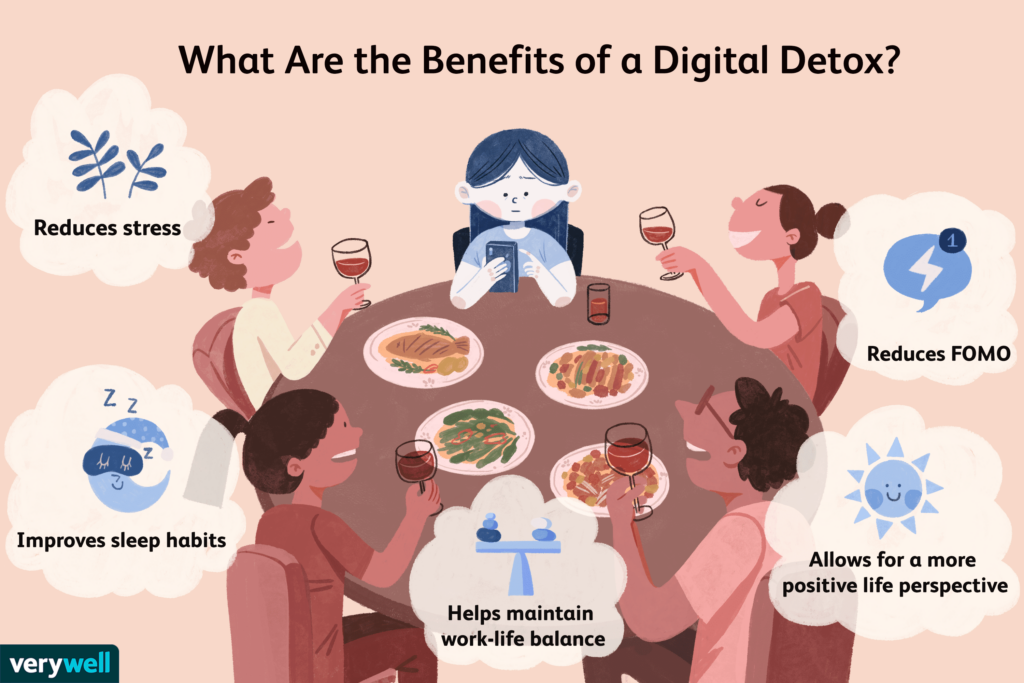DIGITAL DETOX:
A “digital detox” is a deliberate period of time where a person consciously refrains from using digital devices like smartphones, computers, and social media, aiming to reduce reliance on technology and promote more engagement with the physical world, often to improve mental and physical well-being by taking a break from constant digital stimulation.
Key points about digital detox:
- Purpose: To minimize distractions from technology and allow for increased focus on real-life interactions, activities, and self-awareness.
- What it involves :Disconnecting from social media, emails, text messages, and other digital platforms for a set period of time, which could range from a few hours to several days or even longer.
- Potential benefits:
- Improved sleep quality due to reduced blue light exposure from screens
- Decreased stress and anxiety levels
- Enhanced focus and concentration
- Increased quality time with family and friends
- Greater awareness of physical surroundings
- Different approaches:
- Partial detox: Limiting screen time during specific hours of the day or setting aside “tech-free” zones
- Full detox: Completely abstaining from all digital devices for a set period

KEY TECHNOLOGIES:
Digital detox technologies include apps, limiting screen time, and prioritizing offline activities.
Digital detox apps
- Digital detox apps can help you reduce your screen time and disconnect from technology.
Limiting screen time
- Limiting screen time can help you reduce stress, anxiety, and comparison. It can also help you improve your sleep, physical activity, and mental health.
Prioritizing offline activities
- Prioritizing offline activities can help you establish a balance between digital and offline activities. You can try activities like reading, going for a walk, or doing yoga.
Setting clear boundaries
- Setting clear boundaries can help you reduce your screen time and improve your mental health. You can try avoiding non-essential browsing and social media.
Brainstorming replacement activities
- Brainstorming replacement activities can help you create a list of tech-free activities that you enjoy.
Developing good app habits
- Developing good app habits can help you avoid feeling overwhelmed by digital technology.
Mindful consumption
- Mindful consumption can help you become more mindful of the sounds and sights around you.
Unplugging and recharging .
PROS AND CONS OF DIGITAL DETOX:
A digital detox, which involves taking a break from digital devices, can have several pros like reduced stress, improved focus, increased social interaction, and a greater connection to the physical world, but also cons such as potential anxiety from disconnection, feeling isolated from important information, and difficulty managing work or personal responsibilities if completely disconnected for too long.
Pros of a Digital Detox:
- Reduced stress and anxiety: Constant notifications and screen time can contribute to stress levels, so taking a break can lead to a calmer state of mind.
- Improved sleep quality: Limiting screen time before bed can enhance sleep patterns.
- Increased focus and concentration: Without distractions from digital devices, individuals can focus more deeply on tasks.
- Enhanced social interaction: Spending time with others face-to-face can lead to more meaningful connections.
- Greater awareness of surroundings: Being present in the physical world without the constant digital stimulation can lead to a more mindful experience.
- Physical activity boost: A digital detox can encourage people to engage in outdoor activities and exercise more.
Cons of a Digital Detox:
- Social isolation: Feeling disconnected from friends and family, especially if important updates are shared digitally.
- Fear of missing out (FOMO): Worrying about missing important news or events while offline.
- Work disruption: Depending on the job, a complete digital detox may hinder work productivity.
- Withdrawal symptoms: Some people may experience anxiety or restlessness when initially reducing screen time.
- Difficulty managing tasks: Relying heavily on digital tools for reminders and organization can lead to challenges without them.
- Potential for increased loneliness: If not actively replaced with real-life social interaction, a digital detox might exacerbate feelings of loneliness.
Important considerations:
- Gradual approach:Instead of a complete digital blackout, consider gradually reducing screen time to minimize withdrawal symptoms.
- Set boundaries:Decide which digital activities are essential and which can be limited during a detox.
- Plan alternative activities:Schedule engaging offline activities to replace screen time.
- Evaluate personal needs:Consider if a digital detox is appropriate based on your lifestyle and work requirements.

USES:
A digital detox is used to intentionally reduce or completely abstain from using digital devices for a period of time, with the primary goal of improving mental health by lessening stress, enhancing focus, improving sleep quality, strengthening relationships, and creating more time for non-digital activities by minimizing distractions from technology.
Key benefits of a digital detox:
- Reduced stress and anxiety: Constant notifications and information overload from digital devices can contribute to stress; taking a break can help alleviate these feelings.
- Better sleep: Avoiding screens before bedtime can improve sleep quality by reducing exposure to blue light which disrupts the sleep cycle.
- Improved focus and concentration: Less digital distractions lead to better ability to focus on tasks at hand.
- Enhanced social connections: Being present and fully engaged in face-to-face interactions with others without the distraction of devices can strengthen relationships.
- Increased self-awareness: Taking a break from technology can help individuals reflect on their digital habits and identify areas for improvement.
- Boost in creativity: Disconnecting from the constant stream of information can stimulate creative thinking.
- Physical health benefits: Reduced eye strain, neck pain, and headaches associated with prolonged screen time.

